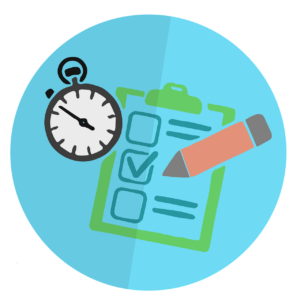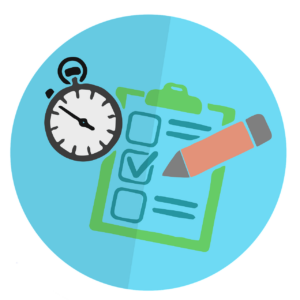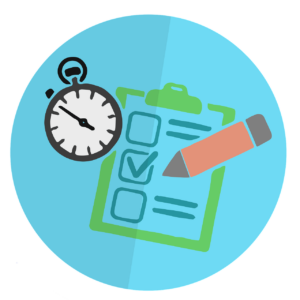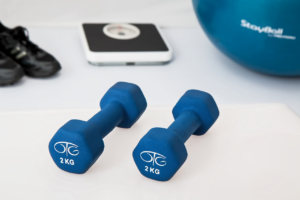Are you a nursing student struggling to answer exam questions? Do you find yourself feeling overwhelmed and unsure of how to approach each question? Don’t worry, you’re not alone.
Answering nursing exam questions can be challenging, but with the right techniques and strategies, you can improve your chances of success. In this article, we’ll discuss essential techniques and strategies for answering nursing exam questions.
We’ll cover topics such as focusing your approach, using your nursing knowledge, managing your time effectively, understanding the different types of questions, and practicing for success.
By the end of this article, you’ll have the tools and confidence you need to ace your nursing exams. So, let’s get started!
Key Takeaways
- Active learning and critical thinking are essential for answering nursing exam questions.
- Understanding the nursing process and thinking like a nurse are important for effective exam tackling.
- Paying attention to keywords, managing time effectively, and prioritizing questions based on difficulty level are key strategies for exam success.
- Practicing test-taking, identifying weak spots, seeking help, and building self-confidence are crucial for nursing exam preparation.
Approach Each Question with Focus and Intention
Don’t just skim through the questions, but approach each one with laser-focused intention to increase your chances of nailing that nursing exam, y’all!
Active learning is key in answering nursing exam questions. This means that you shouldn’t passively read the question, but actively engage with it. Take the time to dissect each question, paying close attention to the details and key phrases.
Critical thinking is also essential in answering nursing exam questions. You need to be able to analyze and evaluate the information provided in the question, and then make an informed decision about the best answer.
Don’t rush through the questions, but take the time to think them through. By approaching each question with focus and intention, you can improve your chances of getting the right answer and achieving success on your nursing exam.
Use Your Nursing Knowledge
Utilize your nursing expertise to effectively tackle exam questions. As a nursing student, you’ve spent countless hours studying and practicing the skills necessary to become a competent nurse. When it comes to answering exam questions, it’s important to rely on your nursing knowledge to guide you through each scenario presented to you.
Here are some techniques to help you utilize your experience and analyze scenarios effectively:
-
Recall the nursing process: Remember the steps of assessing, diagnosing, planning, implementing, and evaluating patient care. Use this framework to help you approach each question systematically.
-
Use critical thinking skills: Analyze the information provided in the question and identify any gaps or inconsistencies. Consider the possible outcomes of each scenario and choose the best course of action.
-
Think like a nurse: Put yourself in the shoes of a practicing nurse and consider how you would handle the situation presented in the question. Consider patient safety and the ethical implications of each decision.
-
Pay attention to keywords: Look for key phrases or words in the question that may guide your answer. For example, if a question asks about priority nursing interventions, focus on the interventions that would address the most immediate patient needs.
Manage Your Time Effectively
When it comes to managing your time effectively during a nursing exam, it’s important to make a plan for your test time.
This means taking into account the number of questions and the allotted time, and allocating time for each question accordingly.
Remember not to spend too much time on one question, as this can eat up valuable time that could be spent on other questions.
Make a Plan for Your Test Time
Maximize your test performance by planning out your time effectively. You need to manage your time properly during the exam to ensure that you answer all the questions within the allocated time. Time management and prioritization strategies are essential to help you achieve this.
To make the most of your test time, start by reading through all the questions and understanding the instructions. Then, prioritize the questions based on their difficulty level and allocate time accordingly.
For example, if you find a question particularly challenging, don’t spend too much time on it. Instead, move on to the next question and come back to it later if you have time. By doing this, you can maximize your test performance and avoid running out of time.
Remember, the key is to stay focused and stick to your plan.
Allocate Time for Each Question
To effectively manage your time during the test, it’s important to allocate a specific amount of time for each question based on its difficulty level. This is a crucial aspect of time management and prioritizing questions.
Here are some tips to help you allocate your time wisely:
- Read the question carefully and identify the key points.
- Determine the difficulty level of the question.
- Allocate more time for difficult questions and less time for easier ones.
- Keep track of your time and move on to the next question if you’re running out of time.
By allocating time for each question, you can ensure that you have enough time to answer all the questions and avoid running out of time. Remember to prioritize difficult questions and allocate more time for them.
With these tips, you can effectively manage your time during the test and increase your chances of success.
Don’t Spend Too Much Time on One Question
Don’t get stuck on a single question for too long during the nursing exam if you want to manage your time effectively. Being strategic with your time is crucial when taking a nursing exam. Remember that you’re given a limited time to answer all the questions, and spending too much time on one question will only leave you less time to answer the rest of the questions on the test.
Time management is a skill that you need to master to overcome test anxiety. If you’re not careful, test anxiety can make you feel overwhelmed and cause you to panic, which’ll ultimately affect your performance on the exam. To avoid this, make sure to allocate your time wisely and don’t spend too much time on one question.
Take a deep breath, read the question carefully, and answer to your best ability. If you find yourself spending too much time on a question, move on to the next one and come back to it later if you still have time. Remember, every question on the exam is important, and you need to answer all of them to the best of your ability.
Understand the Different Types of Questions
When it comes to nursing exams, it’s important to understand the different types of questions you may encounter. Multiple choice questions, fill-in-the-blank questions, and essay questions are the most common types.
By knowing the characteristics of each type, you can be better prepared to tackle the questions and earn a higher score.
Multiple Choice Questions
You’ll find multiple choice questions on nursing exams, so it’s important to know how to approach them effectively. Here are some tips to help you tackle these types of questions:
-
Use the elimination technique: Read the question carefully and eliminate the options that are obviously incorrect. This will increase your chances of selecting the correct answer.
-
Educated guessing: If you’re unsure about the answer, use your knowledge and reasoning skills to make an educated guess. Eliminate the options that are clearly incorrect and choose the best possible answer.
-
Manage test taking anxiety and stress: Multiple choice questions can be stressful, but it’s important to stay calm and focused. Take deep breaths, read the question carefully, and eliminate the options that are clearly incorrect. Remember that you have prepared for this exam and you’re capable of answering the questions correctly.
Fill-in-the-Blank Questions
Now that you’ve learned how to tackle multiple choice nursing exam questions, let’s move on to another type of question you may encounter: fill-in-the-blank questions. These kinds of questions require you to provide a short answer or phrase to complete a sentence or statement.
While they may seem straightforward, there are still effective strategies you can use to approach them and common mistakes you should avoid. One effective strategy is to read the entire question carefully and identify the key words or phrases that’ll help you determine the correct answer. You can also use context clues from the surrounding sentences to help you fill in the blank.
It’s important to pay attention to grammar and spelling, as even a minor mistake can result in an incorrect answer. On the other hand, one common mistake students make is overthinking the question and second-guessing themselves, which can lead to unnecessary confusion and potentially incorrect answers. By staying calm and focused, you can increase your chances of success when faced with fill-in-the-blank nursing exam questions.
Essay Questions
To effectively demonstrate your understanding of a nursing concept, utilizing concise and organized writing skills is crucial when faced with essay questions. One of the most important techniques to master is outlining.
Before you begin writing, take a few minutes to jot down the main points you want to cover in your essay. This will help you stay focused and ensure that you don’t forget any important details. Additionally, outlining can help you organize your thoughts and ensure that your essay flows smoothly from one point to the next.
Another important aspect of answering essay questions is avoiding common mistakes. One of the most common mistakes is failing to answer the question directly. Make sure you read the question carefully and understand what’s being asked of you.
Another mistake is failing to provide enough detail. Be sure to provide specific examples and details to support your points. Finally, be sure to proofread your essay carefully before submitting it. Spelling and grammar errors can detract from the overall quality of your essay and may even result in a lower grade.
Practice, Practice, Practice
To improve your nursing exam performance, you need to practice, practice, practice. Start by taking practice tests, which will help you familiarize yourself with the format and style of questions.
Be sure to review your mistakes and identify areas for improvement. With consistent practice, you’ll be better equipped to tackle any nursing exam with confidence.
Take Practice Tests
Practicing test-taking is like sharpening a sword before battle – it hones your skills and prepares you for the challenges ahead. Taking practice tests is one of the most effective ways to prepare yourself for the nursing exam.
Here are three benefits of taking practice tests and strategies for overcoming test anxiety:
-
Helps you identify your weak spots: Practice tests can help you identify topics or areas you need to focus on more. This way, you can allocate more time and effort to studying the areas that require improvement.
-
Builds your confidence: The more practice tests you take, the more confident you’ll become. Confidence is key when answering nursing exam questions, and taking practice tests can help you develop this trait.
-
Reduces test anxiety: It’s normal to feel anxious before an exam, but excessive anxiety can negatively affect your performance. Taking practice tests can help you become more comfortable with the format and structure of the exam, reducing your anxiety levels. Additionally, practicing relaxation techniques such as deep breathing and visualization can also help overcome test anxiety.
By taking practice tests, you’re exposing yourself to the types of questions you’ll encounter in the nursing exam. This helps you become familiar with the exam format and structure, which can ultimately lead to a better performance.
So, don’t underestimate the power of practice tests – they can be a game-changer in your nursing exam preparation.
Review Your Mistakes
As you review your mistakes, you can gain valuable insights into areas where you need to improve your understanding and knowledge. Analyze your mistakes carefully and try to identify patterns, such as recurring errors or common misunderstandings. Once you’ve identified these patterns, you can take steps to address them, such as focusing your study efforts on specific topics or seeking help from a tutor or mentor.
Learning from errors is an essential part of the learning process, and it can help you avoid making similar mistakes in the future. When you review your mistakes, don’t just focus on what you got wrong. Take the time to understand why you got it wrong and what you could have done differently. By doing so, you can develop a deeper understanding of the material and improve your overall performance on nursing exams.
Remember that no one is perfect, and everyone makes mistakes. The key is to learn from your mistakes and use them as opportunities for growth and improvement.
Identify Areas for Improvement
Now that you’ve reviewed your mistakes, it’s time to identify areas for improvement. This step is crucial in helping you focus on the topics and concepts you need to work on.
Identifying weaknesses can be challenging, but it’s an essential part of the learning process. It allows you to understand your strengths and weaknesses, and it helps you determine the areas that need the most attention.
Once you’ve identified your areas for improvement, seek help. Nursing exams can be challenging, but there’s no need to feel overwhelmed. There are many resources available to help you, such as online tutorials, study groups, and review courses.
Don’t be afraid to ask for help, as it’s an excellent way to learn and improve. Remember that seeking help is a sign of strength, not weakness. By doing so, you’re taking a proactive approach to your learning and ensuring that you’re fully prepared for your nursing exams.
Stay Calm and Confident
You’ve got this! Believe in yourself and your abilities.
When it comes to nursing exams, it’s important to stay calm and confident. Don’t panic, stay positive, and focus on the task at hand.
Remember, you’ve put in the time and effort to prepare, so trust in yourself and your knowledge.
Believe in Yourself
Trusting in your abilities is key to acing nursing exams. Building self confidence is essential in order to approach exams with a positive mindset. One of the ways to build self confidence is by focusing on your strengths and skills. This means recognizing what you are good at and appreciating your abilities. When you focus on your strengths, you can feel more confident and capable of tackling any exam questions.
Another way to overcome self doubt is by setting realistic expectations. It is important to remember that no one is perfect, and that making mistakes is a natural part of learning. Setting achievable goals for yourself and celebrating your successes along the way can help boost your confidence and motivate you to keep pushing forward. Below is a table that summarizes some key strategies for building self confidence and overcoming self doubt in the context of nursing exams.
| Strategies for Building Self Confidence | Strategies for Overcoming Self Doubt |
|---|---|
| Focus on your strengths and skills | Set realistic expectations |
| Celebrate your successes | Recognize that making mistakes is a natural part of learning |
| Surround yourself with supportive people | Practice mindfulness and positive self-talk |
Remember, believing in yourself is the first step to success. With the right mindset and strategies, you can approach nursing exams with confidence and achieve your goals.
Don’t Panic
Don’t freak out! Staying calm and collected during nursing exams is crucial to performing at your best. It’s natural to feel anxious and nervous, but panicking will only make things worse.
To combat these overwhelming feelings, incorporate mindfulness techniques and breathing exercises into your study routine. Mindfulness techniques, such as meditation and visualization, can help you stay focused and present during your exam. Take a few minutes before the exam to close your eyes, take deep breaths, and visualize yourself successfully answering each question.
Breathing exercises can also help calm your nerves and increase your oxygen levels, allowing you to think more clearly. Practice deep breathing exercises, such as inhaling for four counts, holding for four counts, and exhaling for six counts, to help regulate your breathing and reduce stress.
Remember, staying calm and collected during your nursing exam is essential, and incorporating mindfulness techniques and breathing exercises into your study routine can help you achieve success.
Stay Positive and Focused
Now that you’ve learned not to panic during nursing exams, it’s time to focus on maintaining motivation and overcoming distractions. It’s easy to get overwhelmed by the amount of information you need to remember, but staying positive and focused can help you stay on track.
To maintain motivation, remind yourself of why you chose to become a nurse in the first place. Think about the impact you can make on patients’ lives and the satisfaction you’ll feel when you pass your exams. Additionally, try to break down your study sessions into manageable chunks and reward yourself after completing each one. This will help you stay motivated and avoid burnout.
To overcome distractions, create a study environment that works for you. This may mean finding a quiet space to study, turning off your phone, or using noise-cancelling headphones. Additionally, try to limit your study sessions to a specific amount of time and take breaks in between. During your breaks, do something that relaxes you, such as taking a walk or listening to music.
By staying positive and focused, you’ll be able to tackle nursing exam questions with confidence and ease.
Here are some tips to help you maintain motivation and overcome distractions:
- Remind yourself of your goals and why you chose to become a nurse.
- Break down your study sessions into manageable chunks and reward yourself after completing each one.
- Create a study environment that works for you, such as a quiet space or noise-cancelling headphones.
- Take breaks in between study sessions and do something that relaxes you.
Frequently Asked Questions
What is the format of a typical nursing exam?
When preparing for a nursing exam, it’s important to be familiar with the format of the test. Typically, nursing exams consist of multiple choice questions, fill-in-the-blank questions, short answer questions, and essay questions.
To prepare, you should practice answering questions in each of these formats and review the material thoroughly. Some common mistakes to avoid include not reading the question carefully, rushing through the exam, and not managing your time effectively.
To succeed on a nursing exam, take your time, stay focused, and utilize any resources provided by your instructor.
How many questions are usually included in a nursing exam?
When taking a nursing exam, it’s important to be mindful of time management, as most exams include a large number of questions. Depending on the specific exam and its level of difficulty, you can expect to see anywhere from 50 to 250 questions.
It’s essential to pace yourself and avoid spending too much time on any one question, as this can eat up valuable time that could be used to answer other questions. To make the most of your time, you can use techniques such as scanning the questions first to identify the easiest ones to answer and flagging the more difficult ones to come back to later.
Additionally, it’s important to stay calm and focused, and to use your critical thinking skills to analyze each question carefully before answering. By following these tips for answering nursing exam questions, you can increase your chances of success and achieve your goals.
What are some common topics covered in nursing exams?
When taking a nursing exam, you can expect to see questions covering a variety of topics. Two common areas that are often covered are pharmacology and patient care.
Pharmacology questions may include medication interactions, side effects, and dosages.
Patient care questions may include proper techniques for bathing, feeding, and transferring patients, as well as understanding vital signs and recognizing signs of distress.
It’s important to study and review these topics thoroughly in preparation for your exam.
Are there any specific study materials recommended for nursing exams?
If you’re looking for nursing exam preparation materials, there are several recommended resources that can help you succeed.
Many nursing programs provide their own study materials, such as textbooks and practice exams, which can be a great starting point.
Additionally, there are a variety of third-party resources available, such as review books and online study courses, that can provide additional support and help you identify areas where you need to improve.
Consider your learning style and the format of the exam when selecting your resources to ensure that you’re using the most effective tools for your needs.
How are nursing exams graded?
Nursing exam scoring methods vary depending on the type of exam and the institution administering it. Some exams are graded on a pass/fail basis, while others use a numerical score or letter grade.
Regardless of the scoring method, there are tips for improving nursing exam performance. These include studying regularly, practicing critical thinking skills, using resources such as textbooks and practice exams, and seeking help from instructors or tutors when needed. It’s also important to get enough rest and manage stress levels before and during the exam.
By following these strategies, you can increase your chances of success on nursing exams.
Conclusion
Now that you’ve learned the essential techniques and strategies on how to answer nursing exam questions, you can confidently face any exam with focus and intention.
By using your nursing knowledge, managing your time effectively, and understanding the different types of questions, you can increase your chances of acing your exams.
Remember to practice, practice, practice. This will help you familiarize yourself with the types of questions and how to answer them correctly.
Stay calm and confident during the exam, and trust in your abilities as a nursing student.
With these tips in mind, you’re well on your way to success in your nursing career.





















































































































